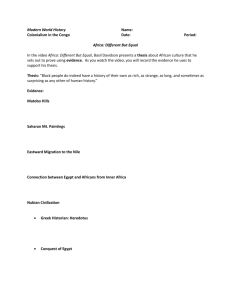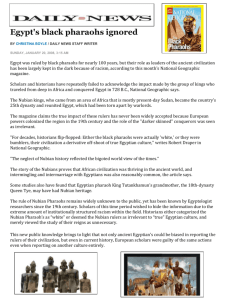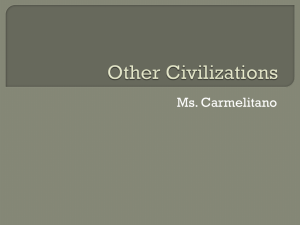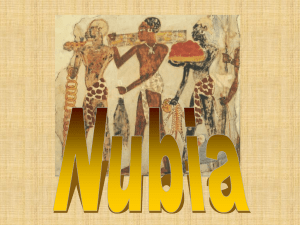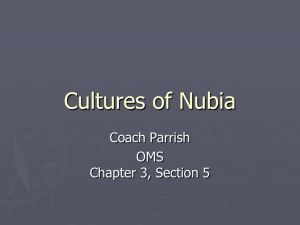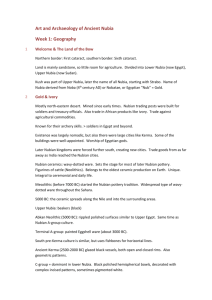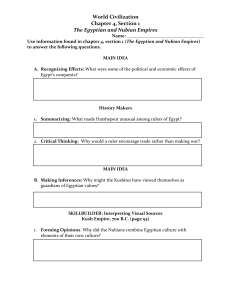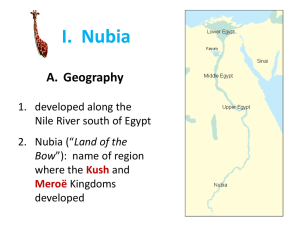HAGGAG HASSAN ADOUL: NUBIA’S HUMAN ASPIRATIONS Interview conducted by Hosam Aboul-Ela
advertisement
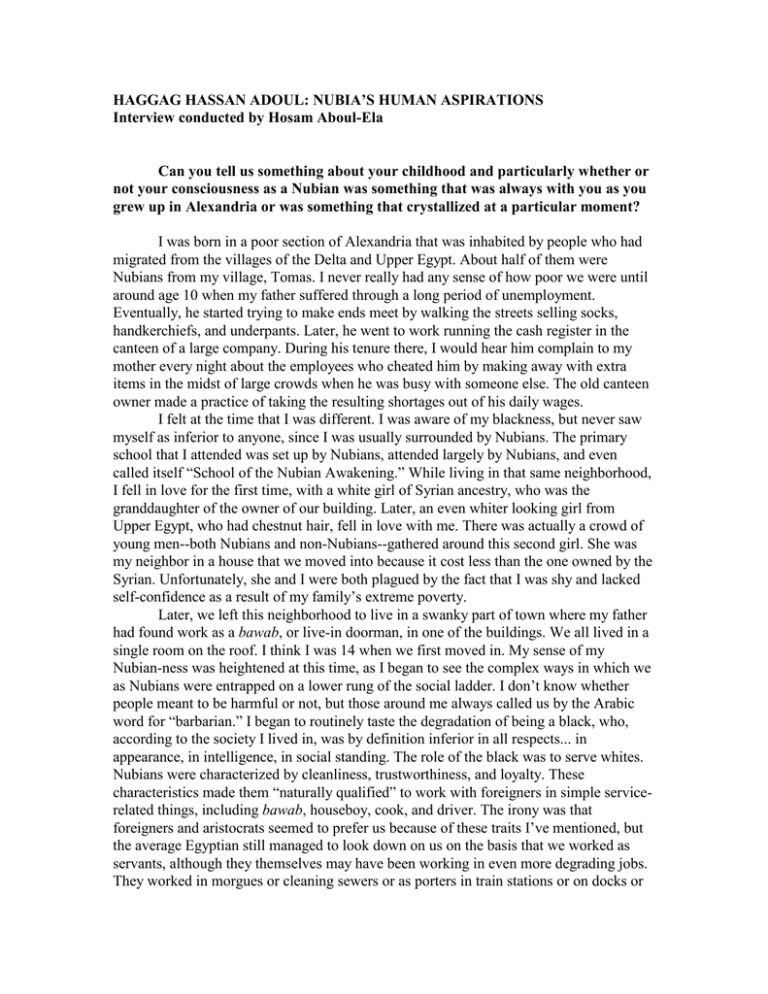
HAGGAG HASSAN ADOUL: NUBIA’S HUMAN ASPIRATIONS Interview conducted by Hosam Aboul-Ela Can you tell us something about your childhood and particularly whether or not your consciousness as a Nubian was something that was always with you as you grew up in Alexandria or was something that crystallized at a particular moment? I was born in a poor section of Alexandria that was inhabited by people who had migrated from the villages of the Delta and Upper Egypt. About half of them were Nubians from my village, Tomas. I never really had any sense of how poor we were until around age 10 when my father suffered through a long period of unemployment. Eventually, he started trying to make ends meet by walking the streets selling socks, handkerchiefs, and underpants. Later, he went to work running the cash register in the canteen of a large company. During his tenure there, I would hear him complain to my mother every night about the employees who cheated him by making away with extra items in the midst of large crowds when he was busy with someone else. The old canteen owner made a practice of taking the resulting shortages out of his daily wages. I felt at the time that I was different. I was aware of my blackness, but never saw myself as inferior to anyone, since I was usually surrounded by Nubians. The primary school that I attended was set up by Nubians, attended largely by Nubians, and even called itself “School of the Nubian Awakening.” While living in that same neighborhood, I fell in love for the first time, with a white girl of Syrian ancestry, who was the granddaughter of the owner of our building. Later, an even whiter looking girl from Upper Egypt, who had chestnut hair, fell in love with me. There was actually a crowd of young men--both Nubians and non-Nubians--gathered around this second girl. She was my neighbor in a house that we moved into because it cost less than the one owned by the Syrian. Unfortunately, she and I were both plagued by the fact that I was shy and lacked self-confidence as a result of my family’s extreme poverty. Later, we left this neighborhood to live in a swanky part of town where my father had found work as a bawab, or live-in doorman, in one of the buildings. We all lived in a single room on the roof. I think I was 14 when we first moved in. My sense of my Nubian-ness was heightened at this time, as I began to see the complex ways in which we as Nubians were entrapped on a lower rung of the social ladder. I don’t know whether people meant to be harmful or not, but those around me always called us by the Arabic word for “barbarian.” I began to routinely taste the degradation of being a black, who, according to the society I lived in, was by definition inferior in all respects... in appearance, in intelligence, in social standing. The role of the black was to serve whites. Nubians were characterized by cleanliness, trustworthiness, and loyalty. These characteristics made them “naturally qualified” to work with foreigners in simple servicerelated things, including bawab, houseboy, cook, and driver. The irony was that foreigners and aristocrats seemed to prefer us because of these traits I’ve mentioned, but the average Egyptian still managed to look down on us on the basis that we worked as servants, although they themselves may have been working in even more degrading jobs. They worked in morgues or cleaning sewers or as porters in train stations or on docks or shining shoes and cleaning cars. Still, they looked down their noses at us. But if the truth be told, we also looked down on them. Our own contempt was so widespread, in fact, that once most foreigners left Egypt, and the aristocrats found themselves under siege in the aftermath of the ‘52 revolution, many Nubians refused to take up their old positions in service of the new elite that rose up to take the place of the old aristocrats and the foreigners. The Nubians had their own word for this new class. They called them Arabadas, or Arabs, implying that they were not of a stock that deserved to be served by others. In reality, we as Nubians never dealt in a racist or oppressive way with any group of common people...ever. The parallel reality was that they always looked down on us. This air of superiority certainly seemed to be a sort of racism. No one seemed even to notice that Egyptian television employed absolutely no broadcasters with dark skin. We never heard of a single black diplomat. There was no recognition of the contributions and sacrifices of the Nubians, even as their lands were repeatedly drowned by dam building. Even today, the pain inflicted on us has not been acknowledged. In spite of all this, we find ourselves accused of racism if we call for any sort of return or restoration, or even for the meager reparations that have already been promised. The other groups within Egyptian society seem to appreciate us only as long as we are silent traitors to our own cause; as long as we are nothing more than quaint folklore; and as long as we are satisfied with inferior status. However, they reject us as soon as we try to pull together as a living community with our own unique lifestyle. They become complete racists as soon as we mention our rights or reparations. But this sensitivity to racism was not that prominent at the time we’re discussing. My identity as a Nubian was very different back then. Nubia was like a river rushing through my insides. I don’t believe I really sensed the catastrophe of the Nubian migration or the particular sufferings of the Nubian people. My father didn’t tell me stories, nor did my mother discuss with me life in our old Nubian village. Why? I’m not sure. I really don’t know. Was it because it was that generation’s plight to struggle just to gather up enough food for us to eat and enough cloth for us to cover ourselves and the most basic opportunity to be educated? Perhaps. They were unschooled themselves. They were also traumatized psychologically. I don’t think it would be an exaggeration to say that they were broken people. My generation and the ones that followed were all overwhelmed by nostalgia for old Nubia, which we had only seen a few times, if at all. How much deeper must the pain have been for that generation that had been born there and lived their childhood and their youth there! And what pain. Damn all those responsible for it! All that generation cared about was hanging together. They just wanted to avoid extinction and to keep together all the following generations. When my father was working as the bawab in this building, I was around fifteen. That was really the time when my consciousness began to form. I began asking myself why the majority of Nubians were poor. There was my father who had taught himself to read and write Arabic. He could also speak Nubian, Italian, French, and some English. As poor as he may have been, he insisted upon reading the newspaper every morning after he had swept the stairs and cleaned the entrance to the building. Why was it that my father happened to be the bawab while some of the tenants that were really riffraff lived in fancy apartments and insisted on looking down on my father? This period marked my consciousness’ first stirrings with respect to Nubia and its pain. My parents may have had their own reasons for not talking to me. It could have had to do with me in particular. I was always very sensitive, both as a child and as a young man. I was closed off, even to the point that I might see my mother sick and not tell her that I hoped she felt better. This really bothered her, to the point that she once asked me, aren’t I your mother? She had no idea that when I was alone I could cry the bitterest of tears. One day my little brother went out with me to the Nubian club building. He was only about eight at the time. When we returned, as soon as he saw our mother he ran toward her with his face filled with wonder, and he swore to her that he had seen Haggag laugh! Then he swore over and over again that what he had said was true. You mention a moment at which your identity as a Nubian took on a political dimension. How does politics fit into your current view of your ancestral home? I don’t think politics has much to do with my outlook to tell the truth. My vision is a cultural and a humanistic one, which perhaps carries within it the political dimension to which you refer. But certainly this essentially cultural vision of mine is not directed against any individual or any state or any race. True culture is simply pro-human, projustice, and pro-pleasure. It is to the furthest extent possible opposed to humanity’s evil side; it struggles against repression, betrayal, and degradation. In general, we can say that it’s simply pro-human in all its manifestations. Does such a vision manifest itself in my literature? I would certainly hope that it is there aesthetically. When bitterness overwhelmed me as a result of the condescension that surrounded us, I had to switch temporarily to a form somewhat distant from the literary in order to expel my bitterness so it would not negatively influence my creative writing. I was forced into article writing, which I came to believe could play a complementary role beside creative writing. I see my primary role as producing literature. A creative vision inheres within literature. Surely, such a vision can influence professional politicians, no matter how much they would prefer to ignore it. What comparisons would you draw between the Nubians in exile in northern Egypt and other diasporated peoples like the Palestinians, African-Americans, and Jews? Every ancient people shares the same distinct character. This character consists of four basic parts: 1--A distinct humanist element. 2--A definite patch of earth to call home. 3--A language originating in the above-mentioned land expressing a particular culture. 4--A long history in which these three elements are intertwined. The forced exile of an ancient people from their natural environment means the destruction of a vital system particular to that place, since that environment is inevitably a basic element of that system. The other three elements cannot flourish outside that environment. Such ancient peoples cannot really live and practice their natural life outside of this environment. Therefore, of course, all exiled peoples suffer miserably and in order to deaden their pain somewhat, they hold fast to their hopes and are nourished by their traditions. They live by them and for them, as a sort of temporary substitute for the land they’ve lost. The tradition itself, in my opinion, is the heart of the fourth element of the distinct character. It is the ancient times, but also the melting pot of the ages that has melted the first three elements into a unity. At the same time, it lets off a specific multilayered atmosphere made up of a group psychology and a collective pool of thoughts and feelings. The tradition is a memory of a bygone era that becomes an account that can be drawn upon. No matter how much the tradition is emblazoned in the collective consciousness, it gradually dissipates in the place and times of the Diaspora. Its clear colors fade. Its strong tones are deadened. Even its very collectivity is broken down when the exiled ones are barred from the place of origin. The solution to these people’s sufferings is return. By bringing back the element of the land, the foundation for bolstering the four basic elements can be formed. By returning and being productive, a part of the ancient times can be transported toward the future. In exile the original language loses its strength... and with the passage of time, it is stored in the closet like the dead languages that are studied in academe. Perhaps, as in the case of Nubian, it remains alive but is emaciated until it is left devoid of all vitality. It becomes a shallow, brittle language, infiltrated mercilessly by other languages that chip away at it a bit more every day. Under these circumstances, it may manage to maintain some of its outer trappings, but in reality it becomes little more than folklore, of interest only to museum curators and not really good for anything other than being observed. Manners and customs in general soon become empty rites for display because they have lost their meanings, their vitality, their unique viewpoint, and their particular way of understanding the world, all in one fell swoop. The exiled people always find themselves stuck between the hammer and the anvil; that is, the hammer of the majority that surrounds them and commits itself to dissolving their uniqueness, and the anvil of the inner brokenness as a result of the loss of the land of origin. That’s why I would argue that all attempts to preserve an exiled culture in generations that are born and raised in exile with no connection to their place of origin will inevitably fail. It’s inevitable that they return to the traditional place of origin. Of course, I’m not talking about being isolated from other peoples or trying to turn back the clock to a pre-modern time. I’m simply arguing for some connection with the place of ancestral origin in order to preserve as many humanistic and cultural characteristics as possible. When you see the ancestral peoples outside of their own natural environment, they are not really themselves. They are simply entities within a real-life museum. Lions are only lions in a forest. Lock them in a cage, and they become mere distortions. An elephant in its native habitat inspires awe, but in a circus, it is a freak attraction. African-Americans, of course, are a special case. It’s impossible for them to return to Africa, yet I’m sure that there is a solution that will allow them to lighten their suffering and their yearning for a place of their own, even if no such solution has been implemented yet. To tell the truth, I’m sure that there are many strong ties binding me to them; just as I am growing increasingly certain that Nubian literature shares many distinguishing characteristics with their literature, for not only are we both African, but we also share many parallel hopes and heartaches. I think perhaps the best way to conclude this response is by quoting something I saw written by a famous British director, who had taken a special interest in Africa, Asia, Australia, and Latin America. He wrote, “In order for us to understand the intense attachment of these peoples to their land, we must consider the fact that the land is their very Bible.” When and how did you start to write? My personal and familial setbacks blocked me from doing any sort of selfinvestigation until I reached age forty. One of the main reasons I could not really examine myself was because of this same old problem of lack of self-confidence. With reference to my late start, I would also note that I was a soldier in the Egyptian army during the war years with Israel. I spent seven years that amounted to a true curse upon me from a psychological, a physical, and a material point of view... and from every other point of view for that matter. Later, around 1984, my first marriage failed, leading to several painful breakdowns. I lost my job because I refused to join in the dishonest actions of the general manager’s little mafia. Instead, I naively tried to expose their wrongdoing. I spent all my savings (which at the time was a lot by my standards) on a visa to one of the petrodollar countries--a forged visa I should say. I stayed there for a year without work and utterly impoverished. I lived in a small rundown flat in an old building and asked myself every night if it would be the night in which the whole thing collapsed and killed all of us inside. My only choices were to give up completely or to challenge myself as I never had, and I chose the latter. A sudden and strange determination and self-confidence swept over me. It was then that I grabbed a pen and began to write in order to prove my talent. When I found my talent acknowledged, I kept writing in order to prove my genius. It was that simple. The use of the phrase “Nubian literature” is, I believe, fairly recent and controversial here. I mean you have certainly been attacked in the press for embracing the term. How do you explain these attacks? What exactly do you mean by Nubian literature? What are its special characteristics and its history? In other words, what distinguishes it from all other Egyptian literature? The use of the phrase “Nubian literature” only dates back to about 1990. It was an annoying phrase for many, and as the phrase began to gain momentum, annoyance turned into flagrant opposition. It didn’t stop there, either. The rejection of the term on the part of some increased until it became an accusation. They accused the Nubians who were using this of racism and separatism. How could such a phrase deserve so harsh a response? What is it about it that justifies impugning the patriotism of those who use it and slandering them as separatists and hotheads? Let’s start by looking at the part of your question dealing with history. The first thing to be written by a Nubian and printed in Arabic was a poetry collection published in 1948 entitled Zhilal Al Nakhil(Under the Shade of the Palms) by the late poet, Muhammad Abdel Rahim Idriss. Over the course of the next 25 years, nothing else was published. Then, in 1964 two publications were issued that put Nubian literature on the map. First, Muhammad Khalil Qassem published his masterwork, the novel Shamandoura(The River Gauge). The same year, an important collection of poetry by various Nubian poets appeared called Sirb Al Balshoun(Flock of Pelicans). About eight other Nubian works appeared around the same time including poetry and novels, but they were much more modest works, and none had anything like the influence of the two that I’ve mentioned. Then, in 1989, the floodgates of Nubian titles in Arabic opened. At the forefront of this group was a collection of stories by Ibrahim Fahmy called Al Qamr Bouba(The Medallion). Since 1989, a plethora of Nubian literature of various kinds has appeared. This recent tidal wave was the basis for the coining of the term “Nubian literature.” During this same period, I was awarded the State Initiative award for 1990 for the collection Vintage Nights of Musk, further legitimizing the Nubian literary movement. Three years later, another Nubian writer, Yahya Mukhtar, was given the same award for his short story collection, ‘Arous Al Nil(Bride of the Nile), meaning Nubians had been awarded the prize two out of three years (since it was withheld in 1992). With this brief overview, we can now tackle this question of the particulars of Nubian literature. There are indeed several characteristics that suggested this nomenclature and that have led to its taking root. All of this writing is set primarily in Nubia. Nubia’s rich details give it a distinct singularity in its ways of life. There’s the ancestral language that’s still used even though so many of the languages that originated around the same time, or even later, have died out. Then there’s the long, special history, and the clear participation in the bequest of human civilization, and the role in the delivery of the world’s great religions. There’s also characteristics of environment and of the colors which blend to produce a rich social tapestry of a very special sort. The near isolation that reigned for so long over Nubia allowed the society to fully digest and Nubianize all foreign groups that passed through or settled there, including outsiders from the maghrib countries to the west or from the Arabian peninsula to the east or from subSaharan Africa to the south or from the northern regions of Egypt itself. This, of course, does not include all the Turks, Europeans, and Asians that came to Nubia as rulers or soldiers. All of this created a complete life-cycle with its own culture, sense of humanity, and tastes. After the forced migration of the Nubians in 1964, there arose yet another distinctive characteristic: a splinter planted in each Nubian’s heart stirring pangs of yearning for that natural environment that was an essential part of their being, both as individuals and as a community... a sense of depression at having been thrown into an artificial environment that neither accepted them nor was accepted by them. They came to be characterized by a unique historical experience of human suffering that was not felt by the rest of Egypt. Since Nubian writers express these various unique particularities of Nubian society, which all come together under the banner of the Nubian character, they produce a literature that tends to have its own particularities as well. Consequently, there was a need for a broad category that could collect this group of work as a body of literature, and store it in its own file. The unique character of Nubian writing is certainly there; so why all this opposition to the term in Egypt? There is a clear reason at the core of the term’s rejection, even if the rejectionists tend not to come out and say it. Historically, it is well-known that old Nubia was actually an empire and an independent kingdom. At the same time, we also know that it was part of the Egyptian empire for centuries, just as it is true that there was once a period in which Egypt was actually a province of Nubia. Since before the dawn of recorded history, there has been a mixing of the two nations. Nubia flowed down to the North, and the North drifted upstream to the South, and the people of the North mixed with the Nubians. That’s why in many parts of nonNubian Upper Egypt one finds Nubian features, just as one finds northern features in many Nubian faces. We all became parts of one whole once Islam entered Nubia, and the local culture incorporated the Arabic culture that had already spread through the rest of Egypt. Arabic became the lingua franca instead of Nubian, which took on a secondary role in the area. (Incidentally, Nubia, which is made up of three major provinces, includes a province that is totally Arab whose origins go back to the Arabian peninsula, and whose people speak no Nubian aside from a few words that have infiltrated their language as a result of constant interaction with the other Nubian groups around them.) For us, there is no conflict between being Nubian and being Egyptian; unfortunately, this is not true of our detractors. How have those who claim that the proponents of a Nubian literature are antiEgyptian managed to forget so easily how we rushed into battle beside our brothers during the Egyptian/Israeli conflicts, and how our Egyptian-Nubian blood watered the sands of the Sinai and the canal region? How have they so easily forgotten Nubia’s repeated bitter sacrifices of its lands so that it could be turned into a water storage area for the whole country? These sacrifices began with the very first dam in 1902, then were repeated with the expansions in 1912 and 1933, until finally the inundation was completed with the completion of the High Dam in 1964. But our victimization is quickly forgotten. It is forgotten that Nubians came up river into the Egyptian cities with no support or reparation from the government that had displaced them, even though many faced barriers of language and all faced the barrier of disorientation in a new and strange setting. In spite of all this, the weapons of distrust were loaded and the swords of suspicion were drawn the moment the Nubian character in all its uniqueness began to leave its mark on our literary map. Thus, in the end, the attacks upon the Egyptian patriotism of the advocates of a Nubian literary movement tell us much more about the attackers than they do about the attacked. Most of us here in Egypt are mentally and psychologically formed to join the herd of followers of a one-party system representing one point of view and following one mode of operation, even if we advertise ourselves as proponents of democracy. Deep down, most of us are of the same stripe, because deep inside ourselves, we feel that we are weak citizens of a state that crushes our human concerns. Our detractors insist that we as Nubians also feel the same sense of loss and lack of self-confidence that they live with constantly. They reject variety by calling it division, and they reject cultural continuity, preferring instead cultural imperialism. They reject innovation as well on the pretext that it challenges cultural roots; and they reject a deep knowledge of Nubia because that would make it impossible for them to forget. If they knew, for example, that the first collection of Nubian poetry was published in 1948 by Muhammad Abdel Rahim Idriss, who was a member of the Egyptian National Council for several sessions, or if they knew that Muhammad Khalil Qassem, the author of the first Nubian novel, Shamandoura, and the mentor of us all, was a fierce Egyptian patriot, it would be impossible for them to make their accusations. Indeed, anyone who could forget the patriotism and courage of Zaki Murad, the Nubian poet and politician who contributed to the Flock of Pelicans collection, would be in serious need of a basic refresher course on our national history. Who is the contemporary writer Yahya Mukhtar but a disciple of that same Qassem, who was imprisoned along with others for his pro-nationalist resistance. There are other Nubian heroes to be mentioned in this context: neither Kleft nor Shindy nor the popular singer Muhammad Hammam nor any number of others were imprisoned for being Nubian or for promoting racism or advocating the secession of Nubia. Rather, all of them landed in jail because they called for Egypt, in the whole of its vitality and diversity, to be for all Egyptians and to live up to its glory and strength. Now that we live in a time in which Nubian writers are branded racists and separatists, we must turn around and ask who among the branders is more patriotic than Khalil Qassem or Zaki Murad? Yet another question remains to be asked: is this a simple matter of aesthetic or literary jealously? I would say that it is. Was not the Alexandrine novelist Edward Al Kharrat slandered as a proponent of a Coptic project? Why? Because he is a literary figure whose efforts have yielded him a great deal of prestige. When his rivals found themselves unable to challenge his justified literary prestige, they looked for some other pretext to attack him and settled upon the specificity of his religious belief. Similarly, in the case of Nubians it is becoming increasingly difficult to deny the weight of the Nubian literary movement. Thus, the Nubian writer is dragged far from his literary production and asked to defend his consciousness as a Nubian. Of course, I myself have suffered such accusations, and I never hesitate to answer them in kind. But the fact of the matter is that in the end, none of these outbursts and swearing and foolishness matter a damn, because if the phrase “Nubian literature” is describing a real phenomenon with deep roots, then it will endure irrespective of attacks launched against it. Similarly, I should be objective and say that if there is no real need for the term other than as an expression of our inflamed emotions at this moment, it will surely die out on its own, even without the screeds of our opponents. What are your future plans as a writer? The Nubian question is my basic concern as a writer. My goal is to preserve the traditions and culture of Nubia and to advocate the return of the Nubian people to their land of origin. My personal plans as a writer cannot be extracted from this Nubian question. Lately, I find myself less and less obsessed with this idea of proving some literary genius; this has become secondary. I remember Stefan Zweig making a comment to the effect that he wanted to be neither the greatest writer nor the greatest critic, but simply a great contributor to humanity. I’m finding that this is becoming my goal as well. I simply want to make a contribution to humanity. The simplest way for me to do this is to continue to wage my struggle to turn the world’s attention to Nubian culture and to provoke the world to recognize and promote its renaissance.
